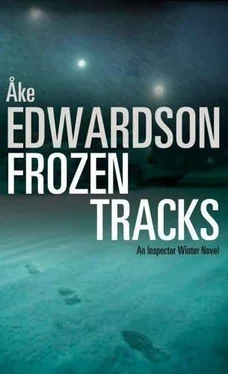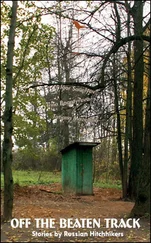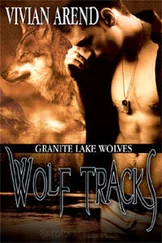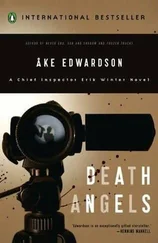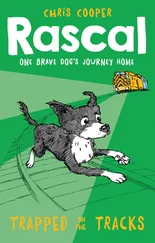He’d shown him the ceiling, the stars on one side and the blue sky and the sun on the other.
“I painted that myself,” he said. “Can you see? No clouds!”
It was his sky, and now it was the boy’s as well. They had lain side by side, looking up at the heavens. Sometimes it was night and sometimes it was day.
“When I come back you’ll get your Christmas present,” he told the boy, who was lying nicely now after the adjustments. “I haven’t forgotten. Did you think I’d forget?”
***
Winter, Ringmar, and Aneta Djanali were watching the video recordings, over and over again. The children looked so small, smaller than any of them had remembered, and the police officers looked like giants. It sometimes seems almost threatening, Winter thought. It’s not easy.
Ellen Sköld’s face was in the picture:
“Pa-pa-pa-pa-pa,” she said, and pirouetted like a ballerina.
“Do you mean your papa? Your daddy?” asked Djanali.
The girl shook her head and said: “ Pa-pa-pa-pa!”
“Did the mister say that he was your dad?”
She shook her head again.
“We-we-we-we,” she said.
Djanali looked at the camera, as if hoping for help.
“This is the part I was thinking of,” she said, nodding toward the picture of herself. She turned to Winter. “She says that over and over again.”
“Co-co-co-co,” Ellen’s voice came through the speakers.
Winter said nothing, continued watching and listening. Ellen told how some mister had said bad words on the radio. It was obvious she objected to that.
Winter came to the same conclusion as Djanali: The man hadn’t heard the bad words. But he’d had the radio on.
Maja Bergort had also heard bad words.
Simon Waggoner had nodded. Perhaps he had heard them as well.
“He has a special time,” said Winter. “He goes on his excursions at the same time.”
Djanali suddenly went cold at the thought.
Ringmar nodded.
“Is that because of his job?” wondered Djanali. “His work?”
“That’s possible,” said Winter. “It’s during the day. He has to adapt. He does shift work. Or he doesn’t work at all and so has all the time in the world.”
“But even so, it always happens at the same time?” said Djanali.
“We don’t know that for certain,” said Winter. “I’m just thinking out loud.”
“Who is the man swearing on the radio?” asked Djanali.
“Fred Gustavsson,” said Ringmar. “He swears all the time.” He looked at Djanali. “Radio Gothenburg. He’s been on ever since it started.”
“Is he still on now?” asked Winter.
“I don’t know,” said Ringmar. “But if there’s somebody saying bad words on the radio it’s bound to be him.”
“Find out if he’s still working for Radio Gothenburg, and if so when that program is broadcast,” said Winter.
Ringmar nodded.
Djanali wound back to the beginning and pressed “play” again.
“Pa-pa-pa-pa-pa,” said Ellen Sköld.
Winter didn’t listen this time, he simply tried to study her face, her facial expressions. That was the main reason they used the video recorder. Her face was in a separate picture now.
There was something there. In her face. In her mouth. Her eyes.
“She’s aping somebody!” said Winter. “She’s imitating somebody!”
“Yes,” said Djanali. “It’s not her face anymore.”
“It’s not her own face when she says her pa-pa-pa-pa-pa,” said Winter.
“She’s imitating him,” said Ringmar.
“Bi-bi-bi-bi-bi,” said Winter.
“Co-co-co-co-co,” said Ringmar.
“Pa-pa-pa-pa-pa,” said Winter.
“What is she trying to say?” asked Ringmar.
“It’s not what she’s trying to say,” said Winter. “It’s what he’s trying to say to her.”
“Pa-pa-pa-pa-parrot,” said Djanali.
Winter nodded.
“He stutters,” said Djanali, looking at Winter, who nodded again. “He stutters when he talks to the children.”
***
They were sitting in Winter’s office. Ringmar had called for Thai delivery in attractive cardboard cartons. Winter could taste coriander and coconut with prawns in red chili paste. It was spicy, and he could feel the beads of sweat on his forehead.
“Anyway, Merry Christmas,” said Aneta Djanali, waving her chopstick in the air.
“It’s not head cheese and red cabbage, I’m afraid,” said Ringmar.
“Thank God for that,” said Djanali.
“Do you eat any of the traditional Swedish Christmas meals?” asked Ringmar.
“I was born here in Gothenburg,” said Djanali.
“I know that. But the question stands.”
“Do you think it’s genetic, or something?” she said, fishing up a prawn with her chopsticks.
“God only knows,” said Ringmar. “I’m just curious.”
“Jansson’s Temptation,” she said. “I just love the herring baked in cream with onions and potatoes.”
“Did your African parents make Jansson’s Temptation at Christmas-time?” asked Ringmar, dropping a lump of chicken, which fell back into the carton.
“Thai food shouldn’t be eaten with chopsticks,” said Winter. “We can blame Chinese restaurants for drumming the wrong idea into our heads. The Thais use a fork and spoon.”
“Thank you for that, Mr. Know-it-all,” said Ringmar, “but couldn’t you have mentioned that sooner?”
“It was just a thought,” said Winter. An attempt to distract you, he thought.
“Do you have any forks in your office?” Ringmar asked.
“In Thailand they never stick the fork in their mouths,” said Winter in an exaggeratedly pompous tone of voice. “It’s just as bad as when we put a knife into our mouths.”
“No wonder they’re all so small and thin,” said Ringmar.
“You’ve got it all wrong, Bertil,” said Djanali. “You can shovel more food down if you use a spoon.”
“Do you have any spoons in your office, Erik?” Ringmar asked.
***
It was dusk. Winter had turned on the lights in his office. He was smoking by the window, the day’s first Corps. It was a must after the food, even though the chili and coriander didn’t really go with the spices in the cigarillo.
He could see the stars, very faintly. It might just be a clear Christmas Eve evening. A sky full of stars. The silent beauty in the sky. He thought of Simon Waggoner. He had decided not to do any telephone interviews. That might only confuse the boy, spoil the possibilities.
He took a drag at his cigarillo. He had a taste of roasted onion in his mouth that disappeared, thanks to the smoke. Many thanks. Peeling an onion, he thought. This job is like peeling an onion, layer after layer. What will be in the center? That’s our problem, isn’t it, Erik? An onion is made up of its layers. When the last one has gone, there’s nothing left. But we keep on peeling.
He heard a streetcar approaching before he saw it. A distant and muffled clattering on the tracks.
They’d talked about it.
“Chasing after a streetcar?” Ringmar had said.
“Follow the tracks,” Djanali had repeated. “Why streetcar lines, or streetcar tracks, Erik?”
“It was the first thing I thought of,” he’d said. “I was standing in the Allé and I could see the streetcars and the streetcar lines and I just associated them with what Simon had said.”
That was where they had gotten to now. He turned around.
“Be careful,” said Ringmar.
“I know,” said Winter. “But we don’t have much time. If an idea pops up, you go with it.”
“But what if we think of other tracks?” said Djanali.
“We should,” said Ringmar.
“His own tracks,” said Djanali. “He was driving around with Simon and following his own tracks.”
Читать дальше
